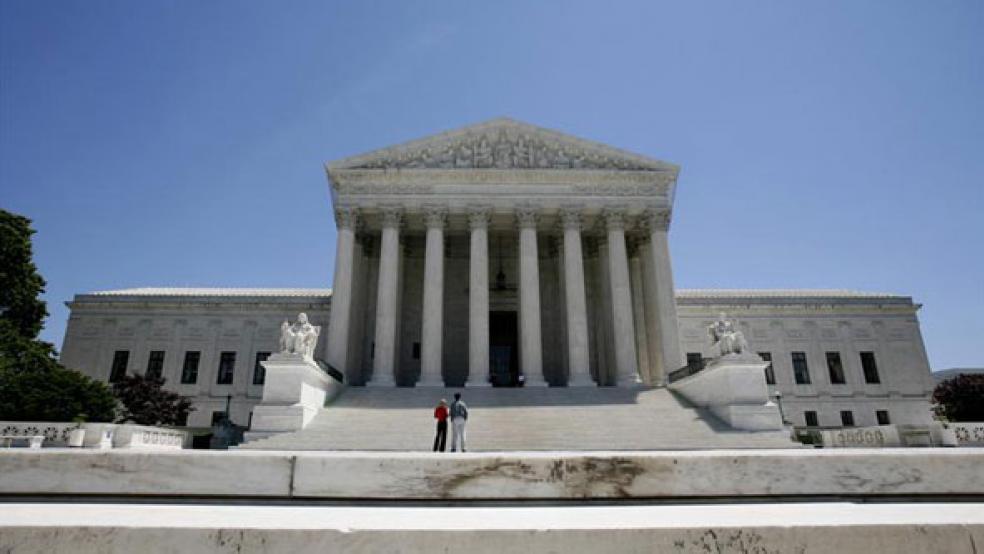Senate Majority Leader Mitch McConnell (R-KY) drew a line in the sand on Saturday by saying that his chamber of Congress won’t even consider President Obama’s nominee to replace Supreme Court Justice Antonin Scalia. Now, some of McConnell’s fellow Republicans are backing away from that line.
The Kentucky lawmaker’s snap decision seems to have given some of his colleagues whiplash, and they have begun to openly question whether flat-out refusing to even consider the president’s eventual choice is the best course of action.
Related: Republicans Gear Up for a Bitter Fight Over Scalia’s Supreme Court Seat
Senate Judiciary Committee Chair Chuck Grassley (R-IA), who agreed with McConnell over the weekend, now says he hasn’t decided whether his panel will hold a confirmation hearing for an Obama nominee.
“I would wait until the nominee is made before I would make any decisions," Grassley told reporters, according to Radio Iowa. “In other words, take it a step at a time.”
Sen. Thom Tillis (R-NC), a member of the Judiciary panel, went one step further, warning that if lawmakers don’t act, the entire GOP will be painted as obstructionists come Election Day. "I think we fall into the trap if we just simply say sight unseen — we fall into the trap of being obstructionist," he said during an interview on "The Tyler Cralle Show," as first reported by ThinkProgress.
"If he puts forth someone that we think is in the mold of President Obama's vision for America, then we will use every device available to block that nomination, wait for the American people to voice their vote in November and then move forward with the nomination after the election," he added.
Republicans have come under withering criticism over their announced strategy, with Democrats casting it as a bald political calculation designed to fire up the GOP base before an election in which the party is doing everything it can to hold onto its slim majority in the Senate.
Related: Supreme Court Battle Tests These Vulnerable GOP Senators' Reelection Chances
Thus far, most of the GOP incumbents in Democratic-leaning states have backed McConnell’s decision, but Sen. Mark Kirk (IL) — considered the most vulnerable Republican in the country — has called the political gamesmanship over Scalia’s seat “unseemly.”
That puts him in the same camp as Sen. Susan Collins (R-ME), who chided both parties for not giving the country enough time to mourn, but sounded open to considering an eventual nominee.
If McConnell does back down, Obama’s selection could ultimately head to the Senate floor for a vote — but what happens there is anyone’s guess, as Sen. Ted Cruz (R-TX), a 2016 White House contender, has promised to filibuster any nominee from receiving an up-or-down vote.
Obama’s made clear he’s moving forward no matter what.
“The Constitution is pretty clear about what is supposed to happen now,” he said during a press conference following the conclusion of the U.S.-ASEAN summit in California. “Historically this has not been viewed as a question. There’s no unwritten law that says it can only be done on off-years. That’s not in the Constitution’s text.”
Related: Two-Thirds of the US Government Basically Won’t Work for the Next Year
The president said he was “amused” by those who claim to be strict interpreters of the founding document but nevertheless come up with “whole provisions that are not there.”
Obama wouldn’t comment on whether he would look for a nominee who is liberal or moderate. “I’m going to present someone who is indisputably qualified for the seat,” he said.
He also wouldn’t rule out the idea of making a recess appointment to fill the seat, though he did say there is plenty of time for the Senate to consider and vote on a nominee.
Obama told reporters that he understood the politics at play for the GOP.
“I understand the stakes. I understand the pressure Republican senators are undoubtedly under” from outside interest groups and the party’s base, but the president said he is following “basic precedent” by going ahead with a nomination.
"It’s the one court where we would expect elected officials to rise above day-to-day politics,” Obama said.





